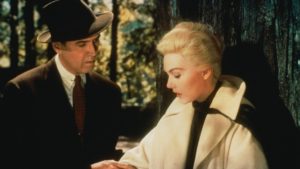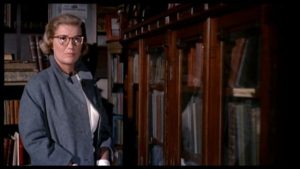Ten years ago, I sent (visiting) friends racing through the streets of San Francisco on a film related scavenger hunt. I had them recreate still shots from notable films set in the western Bay Area. Fun as it was to reshoot some 30 different films in amateur form, I probably needed no more than Vertigo to give a tourists’ introduction to The City. Vertigo is not only a wonderful film, an honored piece of cinematic history, but a travelogue for San Francisco itself. It’s perhaps fitting that the 1958 classic includes dialogue about San Francisco changing over the years. Sixty years past, San Francisco is like the urban version of Mickey Mouse – oh, it will change and evolve and change and evolve some more, but you can still recognize the same Steamboat Willie several generations later.
And sixty years after the original Vertigo release, I don’t know that I’m adding anything new to a discussion of the film. But being that this is the first time I saw it in a theater, I’m going to discuss it anyway.
Let’s identify what this picture is really about: a middle-aged man claiming a gorgeous woman half his age. She’s already married –to another middle-aged man, mind you- and our man in question pursues the impossible despite having a more-than-adequate romantic option right in front of him. As the audience, we’re all rooting for him to do the wrong thing and follow his insanity rather than the sensible and, quite frankly, better option. Of course, which is going to make the more entertaining film?
frankly, better option. Of course, which is going to make the more entertaining film?
I say Vertigo is the original rebuke to white male privilege, which is not to say the film denies white male privilege. Vertigo accepts it, welcomes it, wines and dines white male privilege and finally concludes, “Get over yourself.” Look at how the film develops:
First, there’s action – chasing bad guys over rooftops. Uh oh. Detective John “Scottie” Ferguson (James Stewart) is in trouble. The cop ahead of him turns his attention away from the bad guy and on to Ferguson. This is a mistake, as “Scottie” suddenly discovers he suffers from acrophobia –I’m sorry, but how can you live in San Francisco and not discover until middle age that you suffer from acrophobia?- Scottie’s resulting Vertigo leads to inaction that ends in the death of the fellow officer.
Now look at how the aftermath is handled: Scottie is guilt-ridden, but exonerated of responsibility. The police force doesn’t explore the fact that his acrophobia cost a colleague his life. It never asks why an out-of-shape middle-aged man is jumping rooftops in the first place. And Scottie has decided to quit the force because of the Vertigo, a problem which never came up in the first 50 years of life yet suddenly now seems a detriment to his detecting days. And this is all presented exposition-style in the home of his de facto wife, Midge (Barbara Bel Geddes). It’s hard not to feel for Midge. Midge and Scottie are presented as old college buddies despite Jimmy Stewart being fourteen years older than Barbara Bel Geddes. I think this is exactly the point. She’s clearly been waiting for him while he’s been waiting for HER.
And HER comes along. Scottie is invited to a P.I. gig by a former school chum turned shipping magnate, Gavin Elster (Tom Helmore). His wife, Madeleine (the gorgeous then twentysomething Kim Novak), is possessed by some sort of long dead spirit. She goes into “trances” in which she forgets entire periods of her day. Please, Jimmy Stewart, would you be a pal and make sure no harm comes to her? Scottie gives in. Well, gosh, Madeleine is intriguing, isn’t she? Beautiful, frail, caught in her own world; she looks like somebody who needs to be rescued, and before long, that’s exactly what happens. The entranced woman throws herself in San Francisco Bay and Scottie dives in to rescue her. At that moment, it’s only a matter of time before he falls in love, if he hasn’t done so already.
Let’s review here: Scottie had some trouble on the job. Without any true physical impediment keeping him from work, he chooses to step down and live a life of leisure. (Gosh, I bet that plays well to the masses.) The woman he visits on a daily basis adores him and he treats her like furniture. A take-it-or-leave-it proposition comes along. Scottie takes it and discovers he’s tailing a  mysterious, beautiful woman. Before long, he claims this woman. Doesn’t matter he’s twice her age. Doesn’t matter she’s married. This is where white male privilege gets you – sure, you’re a 4.5 out of 10 and she’s off the scale, but she damaged, lonely, vulnerable, hey, that makes up the difference, right? And it’s a trap. And Alfred Hitchcock knows it. And soon afterwards, we do, too.
mysterious, beautiful woman. Before long, he claims this woman. Doesn’t matter he’s twice her age. Doesn’t matter she’s married. This is where white male privilege gets you – sure, you’re a 4.5 out of 10 and she’s off the scale, but she damaged, lonely, vulnerable, hey, that makes up the difference, right? And it’s a trap. And Alfred Hitchcock knows it. And soon afterwards, we do, too.
I believe Alfred Hitchcock deliberately made this film –among other reasons- to slam the trophy-hunters and the misogyny of his day. Vertigo is sixty years old and, yet, this is one of those films so relevant to our time it’s almost painful. It’s not like trophy-wives have gone out of style; I’d say quite the opposite.
I remember finding Vertigo boring the first time I saw it. Everything seemed too long, too drawn out. That’s the spell of the film. That’s the way my synopsis takes a beating. “White male privilege?! Pffft! Did you see the film? That girl needs him! That girl loves him!” Does she? Does she, really?What does Kim Novak need or want in the film? Does Jimmy Stewart ever get to the part where there is kissing with waves crashing in the background if he doesn’t believe he’s entitled to her touch? What about Barbara Bel Geddes? Isn’t his treatment of her deplorable on at least a level or two? Vertigo is a fabulous spell-binding mystery, yet today I am taken with the statement it makes – if only to me and nobody else.
And if I’m being honest right now, I’d happily ditch Kim Novak in favor of Barbara Bel Geddes; she’s the girl you ought to want.
♪ Somewhere in year sixty
Somewhere, Barbara Bel G
Her love so grand, I understand
It’s time to tell Kim that I’m bailing♫
Rated PG, 128 Minutes
Director: Alfred Hitchcock
Writer: Alec Coppel & Samuel A. Taylor
Genre: An old lesson for a new world
Type of being most likely to enjoy this film: Fans of classics
Type of being least likely to enjoy this film: Barbara Bel Geddes
♪ Parody Inspired by “Beyond the Sea”



